This blog is devoted to coffee, coffee brewing and links to coffee stories, and is a forum for me to share my own reviews and opinions about coffees that I have tried.
Wednesday, December 26, 2012
Sunday, October 14, 2012
Doyo Ethiopian by Intellegentsia (Cherry Coffee)
I will admit it freely that African coffees are among my favorites. I love the fruit notes and aromas given off by the beans. Intellgentsia Coffee recently offered a light roasted bean from the Doyo cooperative in Jimma Ethopia. Jimma is in the west-central part of Ethiopia and according to Intelligentsia's press release about this coffee, its a bit of an unexplored part of the Ethiopian Coffee scene. Only in the last few years with better washing procedures and handling has coffee harvested in this area come into its own.
The full press release from Intellegentsia may be found here: http://www.intelligentsiacoffee.com/sites/default/files/coffee-product-docs/product-doc/Doyo_ethiopia.pdf
So, in an earlier post, I gave the opinion that Allegro's Ethiopian Adado was perhaps the best coffee I have had to date. Intellegentsia's Doyo is at this same vaunted level. The two coffees are a great contrast in outstanding flavor profiles; the Adado being more citric with berries while the Doyo has a rich deep cherry aroma. Doyo is offered in 12oz packages with a one-way valve.
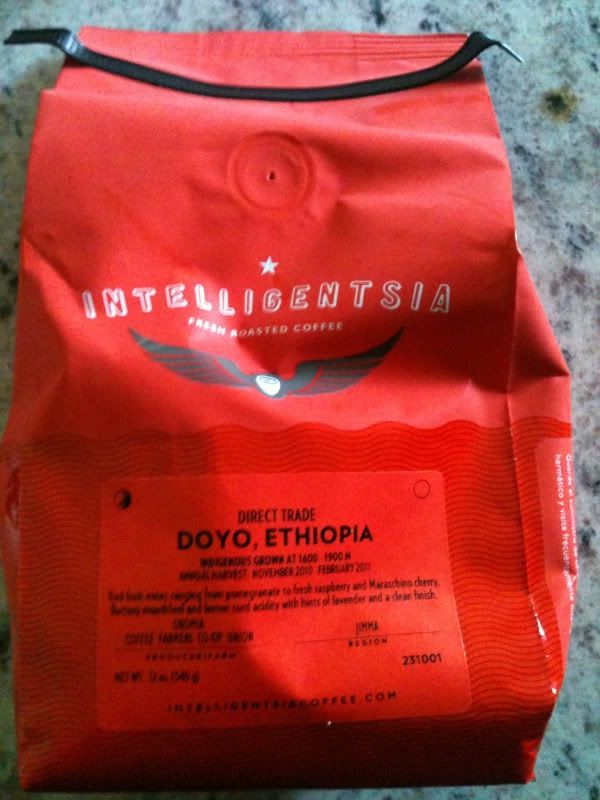
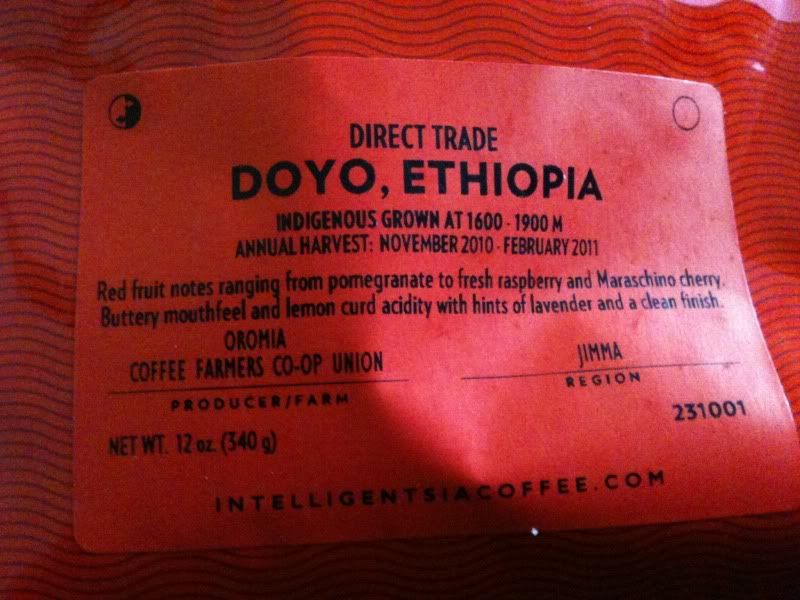
The light-roasted beans are of a fairly typical size for African sourced coffee beans.
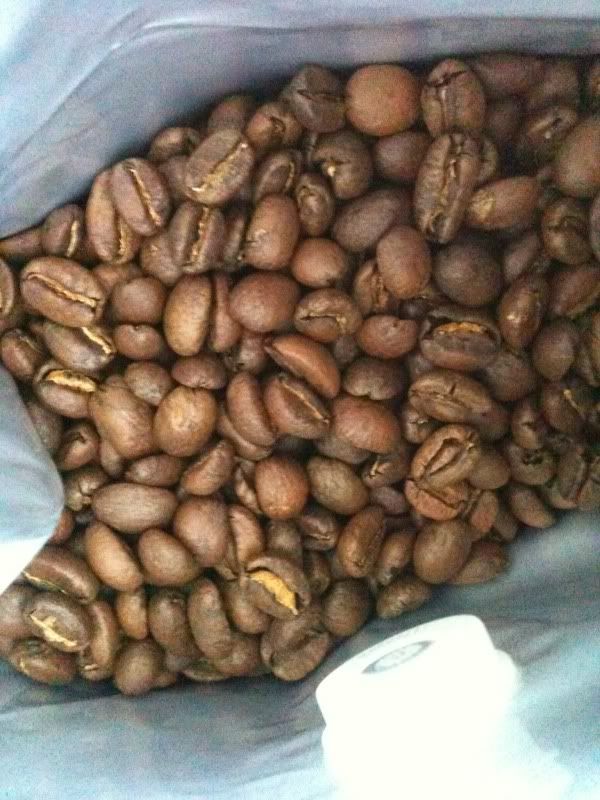
I brewed these aromatic babies up in the french press at 190 degrees with 4 minutes of steeping. A nice thick crema crema of heavenly goodness formed at the top, which thinned a bit when the grounds were stirred for a few seconds. African beans seem to form thinner foamy tops than beans from other countries.
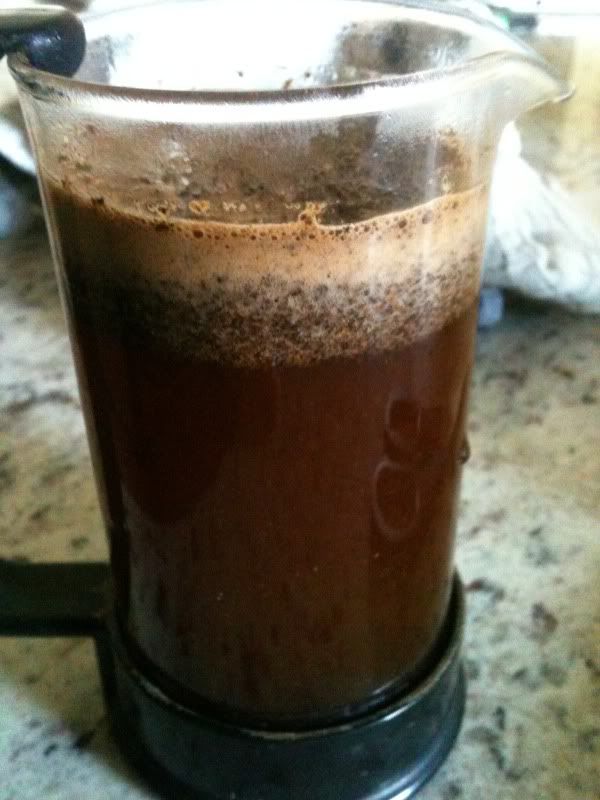
Doyo Ethiopian is awesome. There are simply no other words I can come up with to describe the rich cherry flavors.
The full press release from Intellegentsia may be found here: http://www.intelligentsiacoffee.com/sites/default/files/coffee-product-docs/product-doc/Doyo_ethiopia.pdf
So, in an earlier post, I gave the opinion that Allegro's Ethiopian Adado was perhaps the best coffee I have had to date. Intellegentsia's Doyo is at this same vaunted level. The two coffees are a great contrast in outstanding flavor profiles; the Adado being more citric with berries while the Doyo has a rich deep cherry aroma. Doyo is offered in 12oz packages with a one-way valve.


The light-roasted beans are of a fairly typical size for African sourced coffee beans.

I brewed these aromatic babies up in the french press at 190 degrees with 4 minutes of steeping. A nice thick crema crema of heavenly goodness formed at the top, which thinned a bit when the grounds were stirred for a few seconds. African beans seem to form thinner foamy tops than beans from other countries.

Doyo Ethiopian is awesome. There are simply no other words I can come up with to describe the rich cherry flavors.
Monday, March 5, 2012
Caribou Coffee's Kenya Karibu
My introduction to coffee began in a Caribou Coffee on the north side of Chicago. I spent so much time there studying for school and the bar exam that the baristas and store manager knew me by name and drink preference. I made some great friends and met some very interesting folks, including a WWII / Israeli War of Independence veteran, during my study sessions and when I later moved out of the city, I felt like I was leaving a chapter in my life behind. Sometimes on the weekend, I would have to wait and fight for a table but caribou really creates a relaxed and comfortable environment.
Caribou (CBOU) is the second largest retail coffee chain in the United States behind Starbucks. It started in 1992 outside Minneapolis, MN by Kim and John Puckett. In 1998, they sold a majority stake in the company to Crescent Capital. Crescent Capital later became known as Arcadia Capital. Under Arcadia, Caribou became a publicly traded company on the Nasdaq in 2005. Arcadia sold its shares in Caribou in 2011.
After 2005, Caribou re-made its offerings of coffee beans. Among these is a Kenyan coffee that is only offered during parts of the year. The beans are packaged in a sealed bag with a one-way valve. The bag is 16oz in size. Now Kenyan beans are usually of very high quality and great taste. The result is in a slightly higher price. This is the case with Caribou's Karibu.
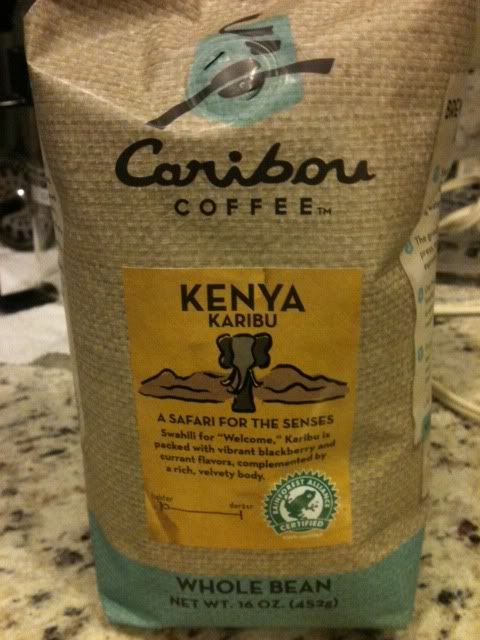
The beans are larger in size and Caribou takes the attractive step of light roasting these beans. As a result, the flavor smacks you in the face as soon as the bag is opened. The predominant aroma of this coffee is blackberry.
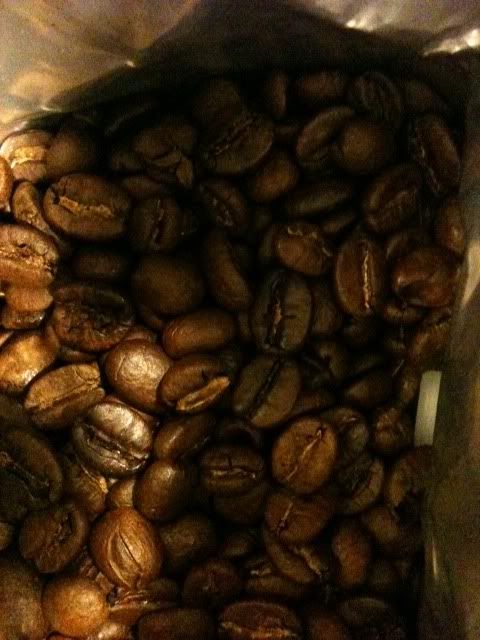
The coffee, when brewed, actually formed a nice little crema. Something I have found hard to achieve with Starbucks beans. The drink is very light in body, delicate and is tart. The blackberry flavor is very strong. I couldn't detect any other flavors in the coffee. The taste was very good but as I moved through the bag, the taste of the coffee began to get weaker. The one thing I enjoy about artisan roasters as opposed to larger retailers like Caribou and Starbucks is that many indicate the roasting date. This is a similar issue that I described earlier with my Illy-fail. I give Caribou props on its Kenya offering. It is a great tasting coffee, much better than I expected from a large retailer. I suspect that the beans had not been recently roasted based on the diminished taste and that leaves me curious as to how much better this coffee could have been had I been brewing it within a week or so of its roasting. I like that this is a light roast. The tarty fruit flavors are really preserved well and made my coffee a very pleasurable experience.
Caribou (CBOU) is the second largest retail coffee chain in the United States behind Starbucks. It started in 1992 outside Minneapolis, MN by Kim and John Puckett. In 1998, they sold a majority stake in the company to Crescent Capital. Crescent Capital later became known as Arcadia Capital. Under Arcadia, Caribou became a publicly traded company on the Nasdaq in 2005. Arcadia sold its shares in Caribou in 2011.
After 2005, Caribou re-made its offerings of coffee beans. Among these is a Kenyan coffee that is only offered during parts of the year. The beans are packaged in a sealed bag with a one-way valve. The bag is 16oz in size. Now Kenyan beans are usually of very high quality and great taste. The result is in a slightly higher price. This is the case with Caribou's Karibu.

The beans are larger in size and Caribou takes the attractive step of light roasting these beans. As a result, the flavor smacks you in the face as soon as the bag is opened. The predominant aroma of this coffee is blackberry.

The coffee, when brewed, actually formed a nice little crema. Something I have found hard to achieve with Starbucks beans. The drink is very light in body, delicate and is tart. The blackberry flavor is very strong. I couldn't detect any other flavors in the coffee. The taste was very good but as I moved through the bag, the taste of the coffee began to get weaker. The one thing I enjoy about artisan roasters as opposed to larger retailers like Caribou and Starbucks is that many indicate the roasting date. This is a similar issue that I described earlier with my Illy-fail. I give Caribou props on its Kenya offering. It is a great tasting coffee, much better than I expected from a large retailer. I suspect that the beans had not been recently roasted based on the diminished taste and that leaves me curious as to how much better this coffee could have been had I been brewing it within a week or so of its roasting. I like that this is a light roast. The tarty fruit flavors are really preserved well and made my coffee a very pleasurable experience.
Subscribe to:
Comments (Atom)